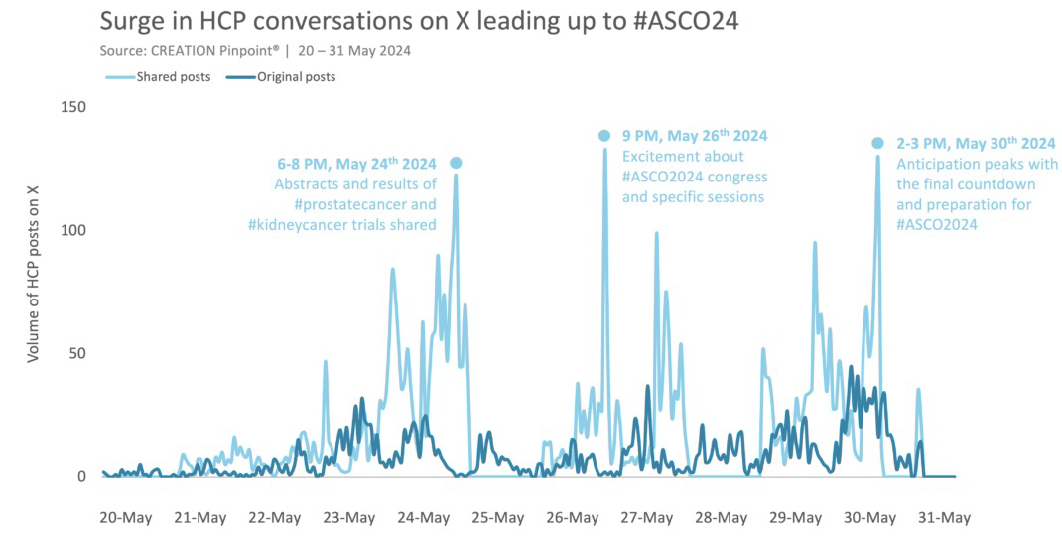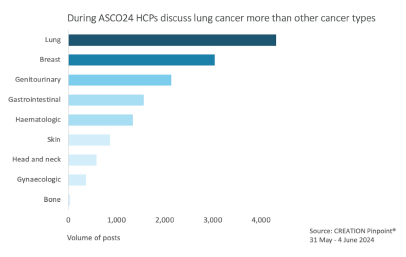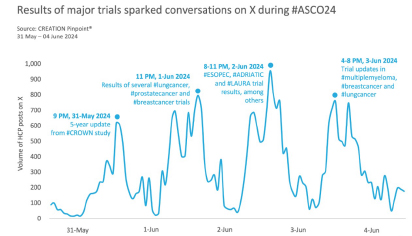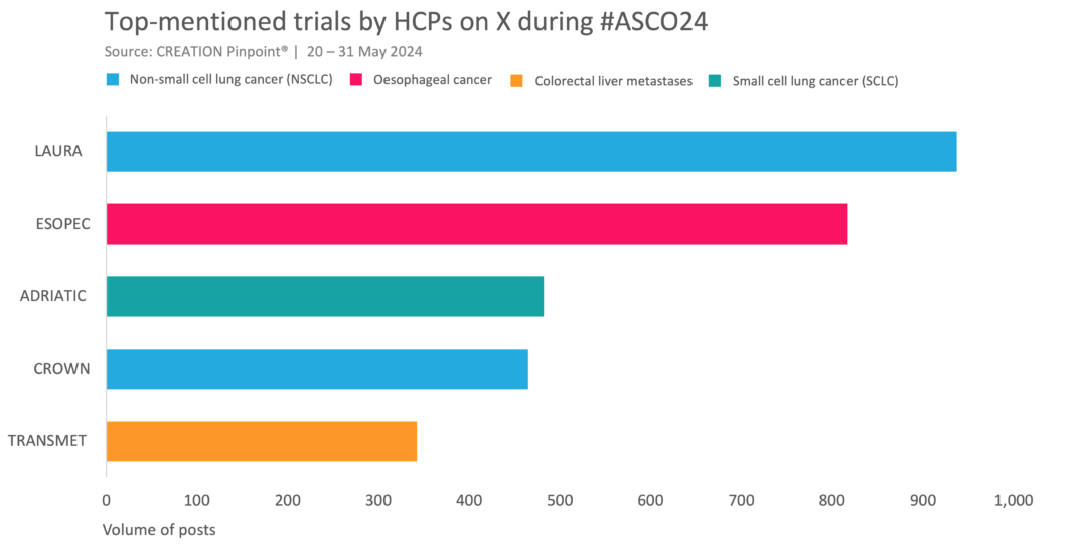Top cancer types, trials, and AI innovations: What HCPs discussed most at ASCO 2024

Kicking off in Chicago on the 31st May, the 2024 American Society of Clinical Oncology’s Annual Meeting - known as ASCO - welcomed more than forty thousand healthcare professionals through its doors. Scores of oncological experts came together from across the globe to discuss, share, and review the latest major advancements in cancer research and treatment.
Summarial media commentary praised the “ground breaking”, “off the charts”, and “extremely impressive” range of data revealed in hundreds of presentations through the five-day-long programme.
Beyond the headlines, however, it’s difficult to sift through extensive coverage of the conference to pinpoint the topics, treatments, and trials considered the most promising for patients in the coming years.
An analysis of the social media conversations of HCPs on the frontlines of oncology goes some way towards providing a remedy, though. In the healthcare industry particularly, online conversations offer a source of unprompted intelligence - an extremely valuable and virtually limitless opportunity for analysis. Through it, we are able to uncover the unfiltered perspectives, attitudes, and sentiments of the millions of HCPs at the forefront of healthcare delivery.
Both in the build up to and during ASCO 2024, we listened to the online conversations of more than 5,000 healthcare professionals. In total, this analysis exceeded 50,000 posts. The aim was to identify the topics that captured attention, the treatments on display that were viewed as the most encouraging, and the areas where HCPs saw practice-changing potential or hesitation-inducing drawbacks.
A buzz of excitement around promising oncological advancements
In the weeks prior to the conference kicking off, we observed a buzz of excitement online. HCPs looked forward to networking with peers and learning more about the most promising advancements in oncology. Dr Tejas Patil likened ASCO to the Cannes Film Festival - “exciting, energetic” and filled with “blockbusters”. Others curated detailed lists of abstract presentations to look out for once the meeting commenced.

During the conference itself, discussion surrounding lung cancer dominated. In fact, it featured in more than 4,000 individual posts by HCPs - significantly more than any other cancer type.

The results of several “practice changing” clinical trials in the space provided the fuel behind this conversation. This was not least the case with the LAURA trial - the “blockbuster” referred to by HCPs in weeks prior. One HCP labelled it the “most awaited” trial of all for thoracic oncologists.
References to the trial, which showed AstraZeneca’s osimertinib demonstrated significant improvements in progression-free survival benefits for patients with non-small cell lung cancer (NSCLC), accounted for almost 1,000 HCP posts on social media. It proved the most discussed trial of all through the conference. In fact, three of the top five most-mentioned trials through the period were those assessing treatments for various forms of lung cancer.
Breast cancer was the second most-discussed cancer type by HCPs during ASCO. It was referenced in more than 3,000 HCP posts. Among these, HCPs shared "breaking news” on a new blood test for predicting cancer recurrence, while others discussed first-line treatments for HER2+ breast cancer. The hashtags #bcsm (breast cancer social media) and #breastcancer were used 684 and 561 times respectively by HCPs.
The third most discussed were genitourinary cancers, including bladder, kidney, and prostate cancers. Within these conversations, HCPs acknowledged positive results from drug combinations for bladder cancer and highlighted data from the CheckMate 901 trial, which showed higher long-term survival rates post-cisplatin treatment.
Digging deeper: HCP responses to major trials

Beyond identifying purely the number of posts discussing trials presented at ASCO, we also dove deeper into what this conversation entailed.
Take, for example, the findings of the LAURA trial, which were presented by Dr Suresh S. Ramanlingam to a “rousing ovation” from those in attendance. On social media, HCPs' immediate responses to the results were hugely positive. Several praised the “massive”, “impressive”, and “incredible” progression-free survival benefits of the treatment.
Others went further still - Dr Sandip Patel labelled the trial as “practice changing”, Dr Percy Lee as a “huge win for patients”, while Dr Nagashree Seetharamu described the results as “mind blowing”.
Despite this sense of optimism, there was also some apprehension. Some HCPs expressed concern at the lack of mature overall survival data for the treatment. A small number also feared that there may have been an under-staging of a significant proportion of patients in the placebo group, leading to a potentially inflated disparity in PFS statistics between osimertinib and placebo.
Overall sentiment, though, remained overwhelmingly positive. Since the conference, osimertinib has been granted both Priority Review and Breakthrough Therapy Designation by the FDA, designed for medicines that “would offer significant improvements over available options”, and those treatments “intended to treat a serious condition and address a significant unmet medical need”.

Our analysis found that HCPs reacted as positively to the other two most-discussed lung cancer trials at ASCO 2024 - ADRIATIC (AstraZeneca’s Imfinzi (durvalumab)) and CROWN (Pfizer’s Lorbrena (lolartinib)).
Posting in response to the former, among more than 400 other HCP mentions, Dr Charu Aggarwal described the trial data as “truly historic”, providing a “new standard of care” in the treatment space.
Amid 465 posts referring to the latter, HCPs praised the “true achievement” of the CROWN trial, which reported the longest progression-free survival benefit in metastatic NSCLC. Oncologist Dr Giannis Mountzios said that the study “sets a new benchmark in precision oncology.”
Beyond major trials: HCPs on artificial intelligence in oncology
Discussion among HCPs also focused on the role of artificial intelligence in the treatment of cancer.
Appearing in more than 400 posts, much of the discussion focused on a recognition of the “transformative role” that AI could play in the treatment of prostate cancer. A talk by Dr Irbaz Riaz on the subject, which focused on the potential of AI in tackling challenges in systemic treatment selection, drew particular attention. HCPs online praised the “fantastic” and “fascinating” session, while another emphasised the “amazing work” of Dr Riaz in advancing the cutting edge of prostate cancer evidence synthesis through generative AI.
Other HCP discussion around the role of AI in cancer treatment included reference to a presentation on how AI is impacting pathological determinations, what future implications may exist for biomarkers, and how AI in digital pathology was showing “promise” for predicting treatment outcomes in advanced gastroesophageal cancer.
Other HCPs used social media to share educational sessions exploring the use of AI in cancer research, and noted how AI can bridge communication gaps to enhance patient-practitioner relationships.
What does it all mean?
ASCO 2024 presented a fascinating range of developments in oncology. From “practice changing” and “truly historic” new trials to transformational artificial intelligence capabilities, the future of cancer treatment appears bright.
By listening to the social media conversations of HCPs throughout meetings such as these, we can identify, interpret, and apply the key attitudes of those on the frontlines of delivering this future.












